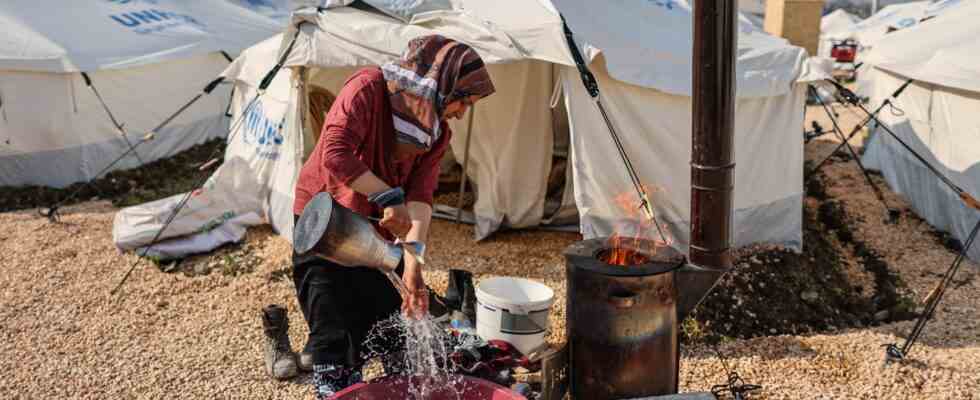Status: 02/28/2023 06:57 a.m
Around two million Syrians live in the areas of Turkey that were particularly hard hit by the earthquake. But many get no help – and are made into scapegoats for the suffering of the people.
“It’s very cold here,” says Abdullah, pointing to a mosque where he and his family were housed. The 80-year-old says that he came here, in the city of Mersin, because he had been told that he could find accommodation in a hall.
Instead, the family was accommodated in the drafty basement of the mosque. Now the Syrian and his family are looking for other accommodation: “We would go anywhere where we could get a place to stay and relax.”
“I can’t find any help here”
Abdullah fled Aleppo with his family in 2014 and found shelter in Antakya, Turkey – until the earthquake destroyed his new home. Many of his compatriots are like him. Around two million Syrians live in the areas particularly hard hit by the earthquake. In the city of Antakya, almost every third resident comes from the neighboring country.
“I can’t find any help here,” says Bassel, who fled the badly damaged city of Kirikhan. He had a small business and is even a Turkish citizen. You can hear his Arabic accent when he speaks Turkish. But he was not initially assigned a place to stay.
“We were promised that they would take us to Antalya and find us accommodation,” he says. But nothing came of it. He has hardly slept for days and is wandering around. He is now trying to somehow get back to Kirikhan with his family. “There is at least one tent for us there,” says the 37-year-old.
Turkish people seeking protection have priority when it comes to accommodation in hotels and empty holiday homes. Bassel says he doesn’t know if he and his wife and daughter will still get state aid. So far nothing speaks for it.
Syrian emergency workers are afraid of attacks
In Mersin, Syrian activists are trying to help their compatriots, organizing makeshift shelters in shops and businesses. The activists are careful to attract as little attention as possible from the Turkish population and ask those seeking protection to keep a low profile.
They are afraid of being discovered and attacked, says one of the activists, who declined to give his name. His idea was to cover all shop windows with paper from the inside so that nobody can see those seeking protection and so that it looks as if the shops were being renovated.
On the one hand, he fears attacks on the street and, on the other hand, deportation to Syria. What is meant are arbitrary deportations to northern Syria, where Turkey controls some parts of the neighboring country with local rebels.
hatred and hostilities
The atmosphere in Mersin is tense. Even before the earthquake, the Syrian refugees felt how “undesirable” they had become in the country, many say. This increased after the disaster.
After the earthquake, the news spread on social media that the city had housed Syrian families in a student residence. Which it was. But the Turkish ultra-nationalist Ümit Özdag then spoke on Twitter: The situation was “unacceptable”. If the Syrians weren’t “brought out,” he would “bring the issue to the Turkish public as party leader.”
His threat took effect immediately. The Syrian families were thrown out of the dorm that same night.
Anti-Syrian populism from AKP and opposition
Ümit Özdağ is the head of Turkey’s ultra-right “Zafer Party” (Victory Party), and he is pursuing a tough anti-refugee policy. He doesn’t shy away from extreme rhetoric, calling the officially 3.67 million Syrian refugees in the country “invaders” and advocating mining the border between Turkey and Syria.
Now he is specifically exploiting the anger and sadness of the people in Turkey over the many victims of the earthquake and portraying Syrian refugees as scapegoats. And the major Turkish opposition parties CHP and Memleket Partisi are also showing their great rejection of Syrians. “We will catch them one by one on the street and send them back,” Muharrem Ince, leader of the Memleket Partisi and the opposition’s lead candidate in the last presidential election, told his supporters in January.
Even the ruling AKP of President Recep Tayyip Erdogan is no longer defending the admission of Syrian refugees. Erdogan speaks of wanting to resettle a million Syrians in northern Syria. The Turkish government promised immediate aid to its own citizens. Each Turkish family is to receive 15,000 lira (about 750 euros). The government also wants to pay Turkish citizens rent for a year. However, this does not apply to affected Syrians.
Back to the rubble
Non-governmental organizations are now drawing attention to the precarious situation of the refugees. According to Amnesty International, there are “credible reports of verbal and physical attacks against Syrian refugees in Turkey.” The Syrian Center for Justice and Accountability also reports attacks on Syrian volunteers and a group of rebels chanting slogans like “Let’s shoot the Syrians in Hatay.”
In many cases, this escalates to open violence, the center warns. Hardly any help and sometimes open hostilities: Some Syrian families have decided to return to the rubble of their collapsed houses in Hatay province. In other places they did not feel safe.

